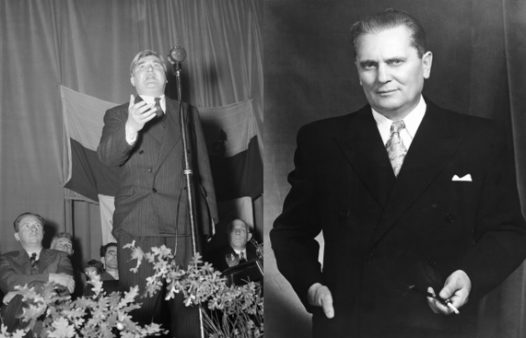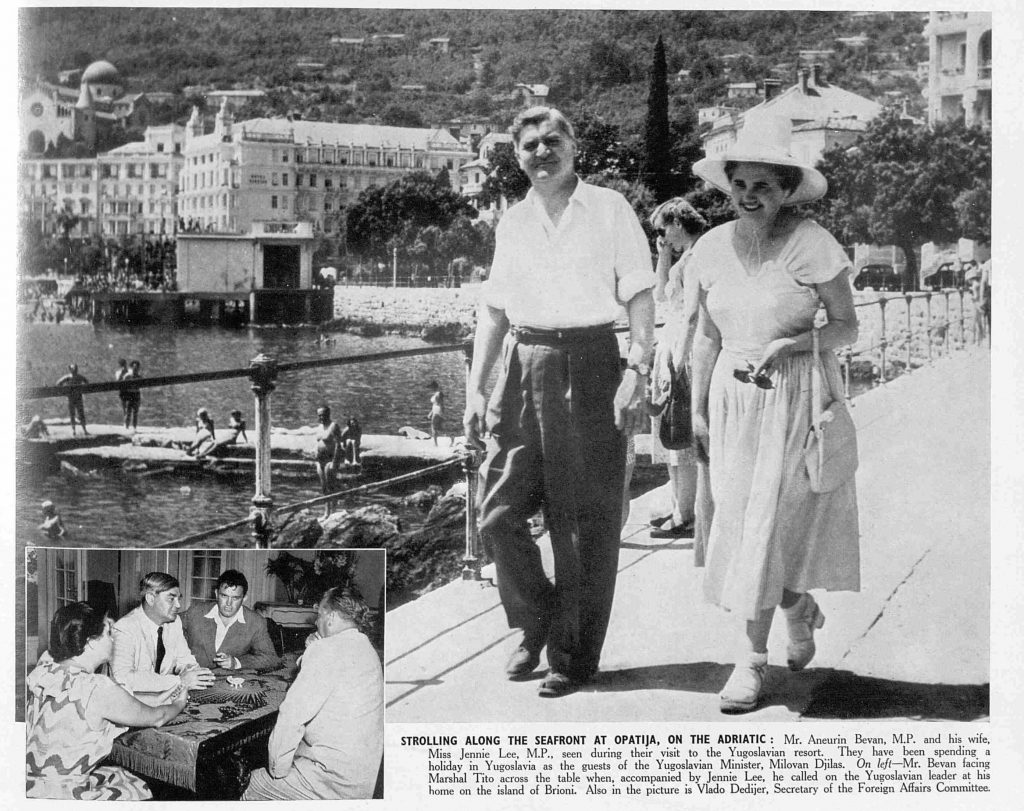“The Tito from Tonypandy”: Bevan and Yugoslavia
5 June 2019
This weekend Wales play a Euro 2020 qualifier in Osijek, Croatia, with travelling fans hoping to see a first-ever Welsh victory against Croatia. Wales have played Croatia 4 times in the past since it became independent from Yugoslavia in 1991. However, the national team had visited Croatia once before it was represented as an independent nation. In 1976, a Welsh team containing the likes of John Toshack and Terry Yorath travelled to Zagreb in Croatia. Wales lost 2-0 in the European Championship qualifier and while the team salvaged a 1-1 at Ninian Park in the return leg, it was a 3-1 loss on aggregate. It was an “oh-so-nearly moment” of Welsh football as the defeat meant the team did not qualify for the finals of the European Championship.
In 1951, twenty-five years before this match, Welsh politician Aneurin Bevan paid his first visit to Yugoslavia. He had recently resigned from the Labour government over charges to teeth and spectacles and accepted an invitation to holiday in Yugoslavia with his wife Jennie Lee, who recorded in her memoir My Life with Nye: “No holiday was ever so timely. We both needed to get away, to see new places, new people, to make new and stimulating political contacts”[1]. The trip would prove fruitful in that regard as they developed new relationships with important officials in the Yugoslavian government and enjoyed hours of discussion over the nature of Marxism, politics, the international arena and other related subjects. It was on this holiday that Bevan began to put together his notes and write In Place of Fear.
Bevan and Lee visited a number of different places in Croatia whilst on their visit, including Dubrovnik and Opatija, as well as the other federal states of Yugoslavia, but the most significant meeting took place on the islands of Brijuni off the north-west coast of Croatia, the official summer residence of Prime Minister (later retitled President) Josip Broz Tito. This meeting was to be the beginning of Bevan and Lee’s conflicted relationship with the Yugoslav communists.

© Illustrated London News/www.maryevans.com
At the meeting, Bevan and Lee met with Tito and a number of his key government ministers. Michael Foot wrote that this was not a very formal meeting: “they sat in a grey stone shelter on the beach, open to the sea on one side and furnished with plain wooden trestle tables and wooden forms, a kind of outdoor dining room but with the flavour, too, of a partisan company’s headquarters”[2]. Foot explained that Bevan “came away with indelible memories of the special quality of Yugoslav bravery, of their absolute resolve to resist Soviet encroachment, of the greatness of Tito, and with another possession more peculiar to Jennie and himself – an immediately established affinity with Milovan Djilas, who had acted as his host in his official residence in Belgrade”[3]. Djilas was a close ally of Tito’s in the Yugoslav Partisan movement during World War Two and later became Tito’s deputy.

Although they did not agree on everything, Bevan, Lee and Djilas enjoyed debating questions of Marxism, politics and philosophy. Lee reflected that the “affinity between Nye and Milovan was not…based on political agreements. It was a matter of temperament. They were both poets, romantics, unrestrainable individualists, stormy, unpredictable mountain types”[4]. Djilas later wrote a letter to Bevan expressing his joy at people from different cultures and different positions merging together and debating ideas:
“It is understandable that – in different countries under different conditions – identical or similar viewpoints are being born. Yet it is striking how ideas unite hitherto unknown people. I think that the personal relationship established between both of you and ourselves is only the beginning of something much more lasting and deeper, the beginning of that unbreakable link between people who through different methods and ways and even from different ideological positions truly fight for the freedom of men and peoples”[5].
Djilas wrote that he was impressed by Bevan and saw him as “a dynamic personality with a lively, unconventional mind”[6].
Bevan came away from Yugoslavia encouraged by what he saw. He was particularly supportive of Tito’s determination to chart an independent course to socialism without the interference of the Soviet Union. Bevan dedicated space in In Place of Fear to acknowledge the path of Yugoslavia after World War Two. He wrote of the revolutionary spirit of Yugoslavia during the war:
“The passionate desire for national freedom, which is the centuries-old tradition of the peoples of Yugoslavia, merged during the war with the revolutionary aims of the Yugoslav Communists. There was therefore a clear understanding between the two. For the urban workers, Socialism, for the peasants, land, and for both national independence”[7].
Bevan believed that this was contrary to the aims of the Soviet leaders. He argued that they had “developed the psychology of what Tito has described as the “leading nation”, which is a polite term for imperialism”:
“Through the medium of the Cominform the Soviet Union wished to bind Yugoslavia to her as she had bound Poland, Rumania, Bulgaria and Hungary. Yugoslav institutions, ideas and policies were to follow the Soviet pattern”[8].
Bevan wrote that Yugoslavia had thrown down a gauntlet to the Soviet Union by insisting on its independence, rather than exchanging “their new-won liberty for the tutelage of the Soviet bureaucracy”. He viewed this situation as the “most striking modern illustration of what happens when political parties apply outworn categories to different national situations and to novel situations within nations”[9].
Bevan and Lee visited Yugoslavia again in 1952, spending time with Djilas in Montenegro before visiting Bosnia. When Bevan and Lee were taken to meet Tito, it would be the last time that Djilas saw Bevan. It was the end of what Djilas called “a selfless common search within the socialist movement from two corners of Europe, two different cultures and types of experience”[10]. A couple of years later, Djilas would be expelled from the Central Committee of the party and stripped of all political functions, being accused of socialist revisionism after he had written articles calling for greater democratisation of Yugoslavia and criticising what he saw as the increased bureaucracy of the party leadership.
During the Third Plenum of the Central Committee in January 1954, Djilas was even accused of falling under Bevan’s influence. Bevan was personally hurt by the news of his friend’s expulsion: he wrote to Tito expressing his concern and to ask about the fate of Djilas and Vladimir Dedijer, another friend from Bevan and Lee’s first trip who was the only person to speak out in defence of Djilas at the Plenum. Bevan also dismissed the charges that he had influenced Djilas’ political ideas[11]. In 1956, Djilas was arrested and spent four years in prison, only to be sent back to prison in 1962 for another four years.
After the arrest of Djilas, Bevan’s engagement with issues in Yugoslavia were not so prominent in his columns for Tribune. He would still praise Tito for standing up to Stalin[12] and insisted that it was “a significant historical fact that the two Communist Parties which have been the most successful are those which were able to follow their own path – in China and Yugoslavia”[13], but he was also more willing to criticise Tito, specifically referring to the imprisonment of Djilas as evidence that there was a lack of liberty under the rule of the Communist Party[14].
Bevan and Lee agitated for Djilas’ release from prison and after Bevan died in 1960, Lee and Djilas would keep in regular contact. Djilas later dedicated his 1961 book Conversations with Stalin to Bevan. Although the events of Djilas’ arrest soured Bevan and Lee’s relations with the Yugoslav Communists, the trip to the Brijuni Islands highlighted a desire to seek out new friendships and allies in a world increasingly divided into two distinct and conflicting ideological blocs. It also represented an attempt to grapple with the different interpretations of socialism in the midst of Labour’s own internal struggles over its future. Bevan’s sympathy towards Yugoslavia might have been responsible for the nickname given to him by Conservative MP and former Secretary of the BMA Chares Hill: “The Tito from Tonypandy”.
Bevan’s trip was not the last trip by a famous Welsh person
to the Brijuni Islands. Richard Burton stayed there as a guest of Tito in 1971
while preparing to play him in a Yugoslavian movie about the Battle of Sutjeska
in 1943, where Tito led the Partisan forces against the Axis powers – but
that’s a story for another post!
The newspaper cutting of Anuerin Bevan and Jennie Lee has been used with the kind permission of the Mary Evans Picture Library
[1] Lee, J. 1981. My Life with Nye. Middlesex: Penguin Books, p. 227.
[2] Foot, M. 1975. Aneurin Bevan: 1945-1960. London: Granada Publishing, p. 343.
[3] ibid. p. 344.
[4] Lee, J. 1981, pp. 228-229.
[5] ibid. p. 345.
[6] Djilas, M. 1985. Rise and Fall. London: Macmillan, p. 275.
[7] Bevan, A. 1952. In Place of Fear. London: William Heinemann, p. 16.
[8] ibid.
[9] ibid. p. 17
[10] Djilas, M. 1985, p. 327.
[11] Foot, M. 1975, pp. 417-419.
[12] Bevan, A. 1954. I put a question mark against his judgement. Tribune 15 October 1954, p. 4.
[13] Bevan, A. 1956. Farewell to the Trojan Horse. Tribune 27 April 1956, p. 5.
[14] See Bevan, A. 1956. The last chance for statesmanship. Tribune 23 November 1956, pp. 1&12: Bevan, A. 1957. The world of Gomulka, Tito – and Djilas. Tribune 27 September 1957, p. 6.
- December 2023
- November 2023
- August 2023
- February 2023
- December 2022
- November 2022
- September 2022
- July 2022
- April 2022
- March 2022
- January 2022
- October 2021
- July 2021
- May 2021
- March 2021
- January 2021
- November 2020
- October 2020
- August 2020
- July 2020
- June 2020
- May 2020
- April 2020
- March 2020
- October 2019
- September 2019
- June 2019
- April 2019
- March 2019
- February 2019
- December 2018
- October 2018
- July 2018
- June 2018
- April 2018
- December 2017
- October 2017
- July 2017
- June 2017
- May 2017
- April 2017
- March 2017
- February 2017
- January 2017
- December 2016
- November 2016
- October 2016
- September 2016
- Bevan and Wales
- Big Data
- Brexit
- British Politics
- Constitution
- Covid-19
- Devolution
- Elections
- EU
- Finance
- Gender
- History
- Housing
- Introduction
- Justice
- Labour Party
- Law
- Local Government
- Media
- National Assembly
- Plaid Cymru
- Prisons
- Rugby
- Theory
- Uncategorized
- Welsh Conservatives
- Welsh Election 2016
- Welsh Elections